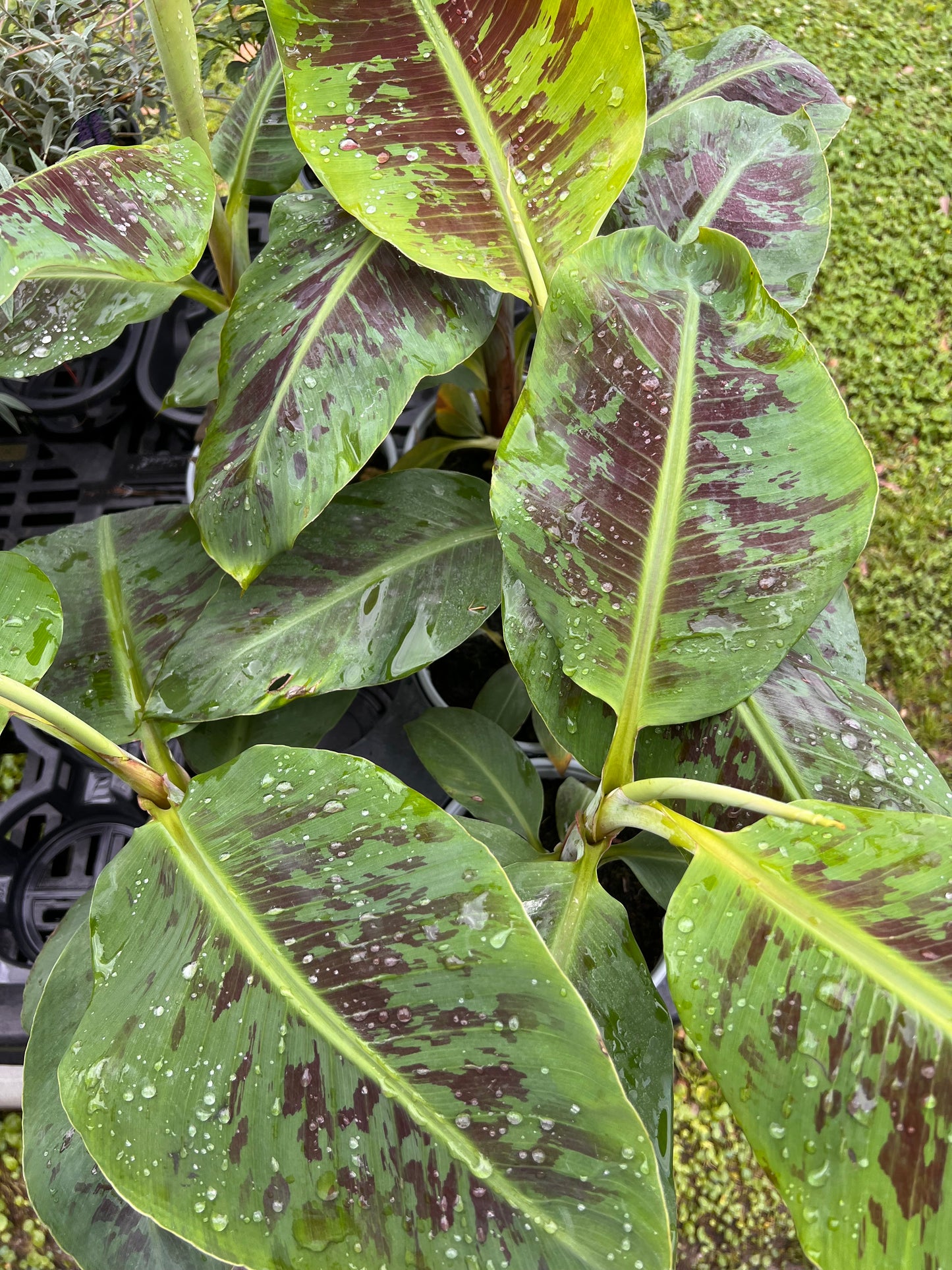Banana 'Musa Grand Nain'
Banana 'Musa Grand Nain'
The Banana 'Musa Grand Nain' is a robust, medium sized cultivar of the Cavendish banana group, well known for producing large, flavorful bananas. This plant is favored for both its fruit production and ornamental value, boasting large, glossy green leaves that add a tropical aesthetic to any garden.
Grow Zones:
USDA Hardiness Zones 9-11. In cooler climates, it can be grown in containers and brought indoors during the winter.
Height & Width:
Height: Typically reaches 68 feet (1.82.4 meters).
Width: The plant has a spread of about 46 feet (1.21.8 meters).
Uses:
Fruit Production: Produces sweet, seedless bananas ideal for fresh eating, smoothies, and baking.
Ornamental: Its large, lush leaves make it a popular choice for tropical-themed gardens or as a container plant in nontropical regions.
Erosion Control: The extensive root system helps in soil stabilization in areas prone to erosion.
Native Range:
Originally from Southeast Asia, the Musa Grand Nain is widely cultivated in tropical and subtropical regions around the world.
Growing Tips:
1. Light: Full sun is ideal for maximum growth and fruit production. A minimum of 68 hours of direct sunlight is necessary.
2. Soil: Prefers rich, welldraining soil with a slightly acidic to neutral pH (5.57.0). Organic matter like compost can be added to improve soil quality.
3. Watering: Regular watering is crucial, especially during dry spells. Keep the soil consistently moist but not waterlogged. Mulching around the base can help retain moisture.
4. Temperature: Thrives in warm temperatures, ideally between 7595°F (2435°C). Protect from frost, as temperatures below 50°F (10°C) can slow growth or cause damage.
5. Fertilization: Regular feeding with a balanced fertilizer (e.g., 8108 NPK) every 46 weeks during the growing season will support vigorous growth and fruit production.
6 Pests & Diseases: Watch out for pests like aphids, spider mites, and nematodes. Common diseases include Panama disease and Sigatoka leaf spot. Regular monitoring and organic treatments can help manage these issues.
7. Harvesting: Bananas typically mature 9-12 months after planting. Harvest when the fruit turns from deep green to a lighter green, with a slight yellowing on the ridges.
---SHIPPING NOTICE PLEASE READ BEFORE PURCHASING LIVE PLANTS!---
We WILL NOT refund the purchase of or the shipping cost of live plants purchased with the intent to be shipped to states that do not authorize importing live plants or to states with restrictions! Purchases to these states will be held for 30 days for pick-up at our Slidell, Louisiana store and the shipping cost associated with these purchases will be held for the care of the plant while waiting to be picked up. All sales are final. If the plant(s) purchased are not picked up within 30 days from the date of order, these items will be returned to our sales inventory and you WILL NOT be refunded. Thank you for understanding these policies.
Due to regulations, certain states have restrictions on importing plants. Please review the list below to ensure you're not attempting to order any restricted plants in your area.
**Important Note:** We do not ship any plants outside the U.S.
State-Specific Restrictions - We ARE NOT responsible for any plant(s) that are not listed in these restrictions. Purchaser bears all responsibility for making sure the plant(s) they desire to purchase are not banned from being imported to the shipping state:
Arizona: Juglans spp.
California: Castanea spp., Juglans spp., Pinus spp., Quercus spp.
Colorado: Some counties restrict Prunus spp. Please verify your local county regulations.
Florida: Castanea spp., Cornus spp., Quercus spp., Cornus mas
Georgia: Vaccinium spp.
Hawaii: Pinus spp.
Idaho: Humulus lupulus, Mentha spp., Vitis spp.
Indiana: Fragraria spp., Rosa spp.
Kansas: Juglans spp.
Michigan: Abies spp., Vaccinium spp.
Montana: Pinus spp.
Nevada: Allium spp.
Mentha spp.
New Jersey: Rosa spp.
New York: Vitis spp.
Oregon: Allium spp., Castanea spp., Corylus spp., Humulus lupulus, Quercus spp., Sambucus nigra, Ulmus spp., Vaccinium spp., Vitis spp.
Texas: Juglans spp.
Washington: Allium spp., Castanea spp., Corylus spp., Humulus lupulus, Vaccinium spp., Vitis spp.
Wisconsin: Abies spp., Pinus spp., Picea spp., Mentha spp.
Additionally, we cannot ship plants in soil medium to the following states: AK, AL, AR, AZ, CA, HI, ID, KS, MS, MT, ND, NM, NV, OK, OR, SD, TX, UT, WA.
Couldn't load pickup availability


